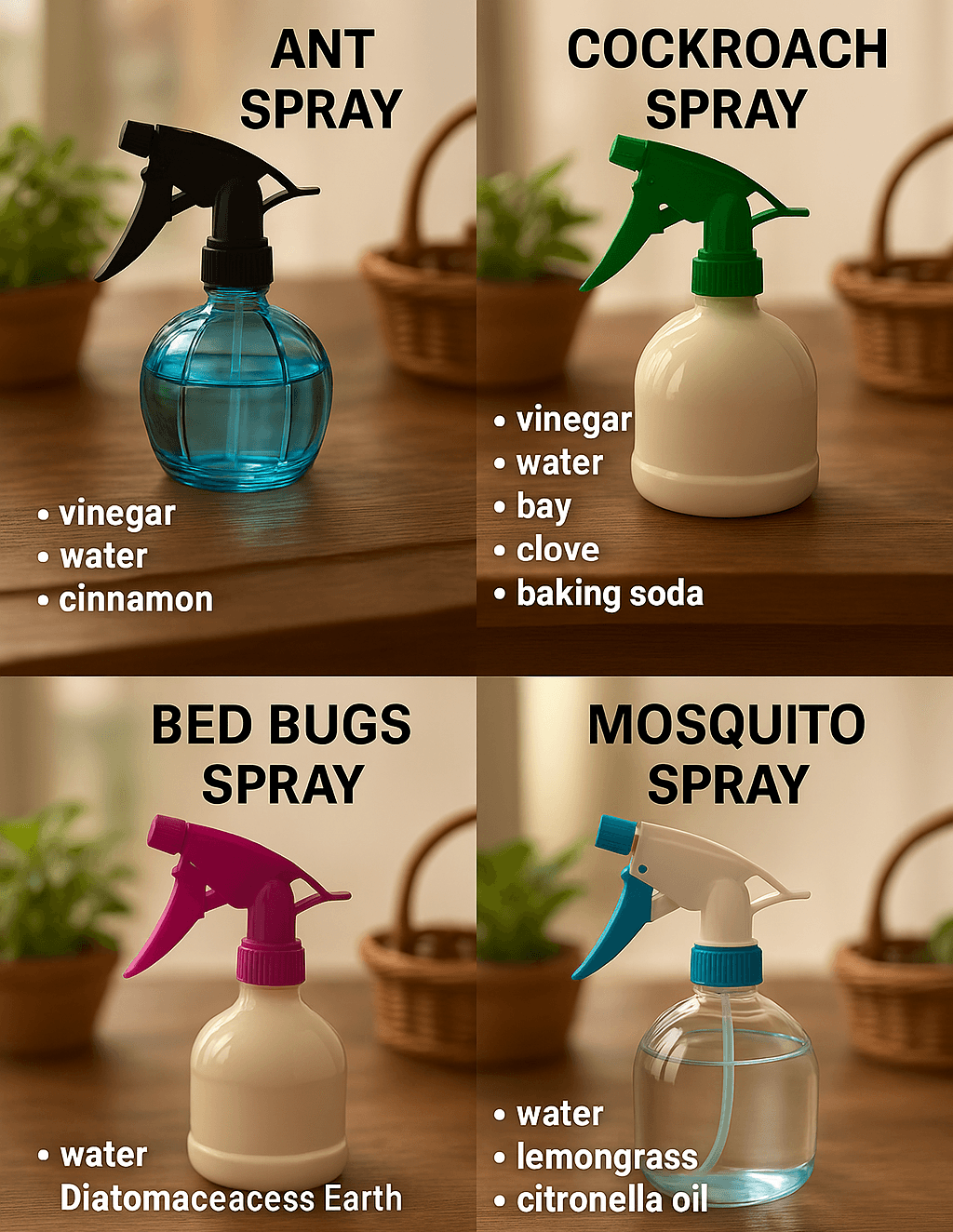Dealing with household insects can be challenging. Many people have tried commercial insect repellents with little success. Instead, the following natural and non-toxic remedies can effectively control various pests using simple ingredients you can find at home.
1. Tick Control
To repel ticks, mix 4 tablespoons of olive oil with ¼ teaspoon of geranium bourbon essential oil in a spray bottle. This blend can be applied to your pet’s body and feet, providing a natural barrier against ticks.
2. Spider Deterrent
For spiders, combine 250 ml of water with 15 drops of peppermint essential oil and ¼ teaspoon of dish soap. Pour this mixture into a spray bottle and target areas where spiders tend to gather.
Reapply this solution once or twice a week until the spiders are gone.
An additional tip is to make small pouches filled with dried herbs, such as rosemary or mint, to place around the house. The scent from the herbs can deter spiders for extended periods.
3. Ant Repellent
Method One: Combine 20 ml of liquid hand soap with 1½ cups of water in a spray bottle. Directly spray this solution on ant trails for effective results.
Method Two: Mix 1 cup of white vinegar with 1 cup of water, adding a few drops of peppermint essential oil or replacing it with 2 teaspoons of cinnamon powder for a pet-friendly option.
This mixture can be sprayed on your floors and cleaned afterward. The vinegar’s acidic nature helps disrupt ant trails and acts as a repellent.
4. Flies Management
To fend off flies, mix 1 cup of water with ¼ teaspoon of lemongrass essential oil in a spray bottle.
Spray this over kitchen countertops or areas where flies tend to gather.
Another method involves soaking a sponge with lavender essential oil and placing it in a closed jar. Open this jar outdoors while dining, allowing the pleasant scent to keep flies away.
5. Cockroach Prevention
Method One: In a cup of water, mix 6 to 8 drops of rosemary essential oil with 8 to 10 drops of peppermint oil. Pour this into a spray bottle and apply it in cockroach-infested areas.
Method Two: Combine 1 cup of water with ½ tablespoon of clove powder, 2 tablespoons of borax, ½ cup of vinegar, and 1 tablespoon of baking soda.
Use this mixture once or twice a week until the cockroaches disappear.
Another approach is to mix equal parts of borax and white sugar with a few drops of tea tree essential oil, dusting it in areas where there’s roach activity.
Cockroaches are also attracted to cocoa powder, so mixing equal parts of this with diatomaceous earth can deter them further.
6. Mosquito Defense
For mosquitoes, blend ¼ cup of water with 2 tablespoons of witch hazel. Then, add 10 drops each of lemongrass and citronella essential oils.
Pour this mixture into a spray or roll-on bottle and apply it to clothing.
The scent of these essential oils works as an effective deterrent against mosquitoes.
Caution: It’s important to dilute essential oils properly before applying them, as they can cause skin irritation when used directly.
7. Bee Repellent
To keep bees away, combine 1 tablespoon of water with 1 tablespoon of peppermint essential oil in a spray bottle. This mixture can be applied to the skin, particularly on arms and ankles, to avoid bee stings.
8. Trap for Fruit Flies
To manage fruit flies, fill a small jar with apple cider vinegar and cover it with plastic wrap.
Secure the wrap with a rubber band, then poke 4 to 6 small holes in the top.
The fruit flies are attracted to the scent of the vinegar and can enter through the holes, but won’t be able to escape.
9. Moth Prevention
Moths dislike the scent of cinnamon. To protect clothes, create sachets with a mix of cinnamon, peppercorns, and cloves.
These sachets can be placed in closets and pantry areas to deter moths.
10. Flea Control
For fleas, mix 1 cup of apple cider vinegar with 1 cup of water in a spray bottle. This solution can be sprayed in areas where fleas are common, providing an effective way to manage the problem.
11. Natural Repellant for Cats
Cats generally avoid certain scents. To keep them away from specific areas, consider planting lavender, peppermint, pennyroyal, coleus canina, rosemary, or lemongrass in your garden.
Try the Bug-Repelling Plant Finder 🪴
Frequently Asked Questions

How can you make a strong mosquito repellent with items at home?
Creating an effective mosquito repellent from household items is simple. A mixture of vinegar and water, or essential oils such as lavender and citronella, can provide protection.
Combining these with witch hazel or rubbing alcohol enhances their effectiveness.
What natural substances effectively repel mosquitoes on the skin?
Several natural ingredients work well to keep mosquitoes away when applied to the skin. Oil of lemon eucalyptus, citronella oil, and tea tree oil are popular choices.
These oils can be diluted with a carrier oil, like coconut oil, for safe application.
Which natural techniques are suggested for preventing insects in indoor spaces?
To keep bugs out of the home, natural methods such as using essential oil diffusers can be effective.
Citrus peels, vinegar traps, and keeping windows secure with screens also help deter insects. Regular cleaning can eliminate food sources and hiding spots.
What are the best natural repellents for outdoor use?
For outdoor areas, natural options like citronella candles, essential oil sprays, and mosquito-repelling plants are recommended.
Foods like garlic can also act as a repellent when crushed and spread around. It’s best to use these items abundantly for the best results.
Can specific plants serve as a natural barrier against household insects and mosquitoes?
Certain plants can indeed deter insects and mosquitoes. Lavender, marigolds, and basil are known for their repellent properties.
Planting these around household entrances can create a natural barrier against pests.
What are the safest natural bug repellent choices for kids and pets?
When it comes to children and pets, safer options include diluted essential oils like lavender or chamomile. Products labeled as safe for kids and pets offer peace of mind.
It’s important to avoid using strong synthetic chemicals in these situations.

